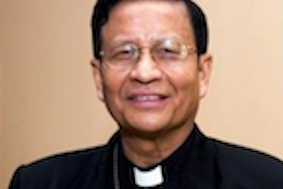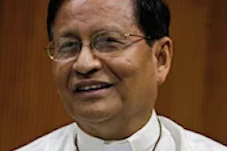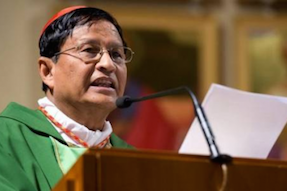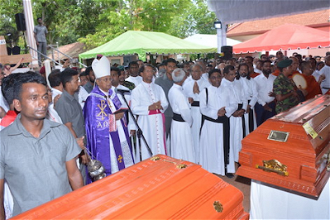Text: Cardinal Charles Maung Bo at Stonyhurst
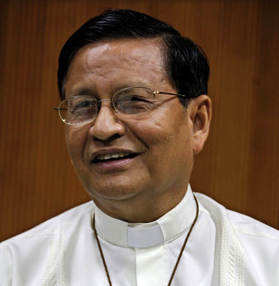
Cardinal Charles Maung Bo
The first Cardinal of Myanmar (Burma), Cardinal Charles Maung Bo, gave an address at Stonyhurst College on Saturday, 21st May. The full text follows:
Ladies and Gentlemen, brothers and sisters, friends, teachers, students -
As a Salesian I have a special love for young people, and so it is a great joy to have this opportunity to address you today. And as a Salesian, I am especially grateful to be invited by this historic, renowned Jesuit institution.
Whenever I am with Jesuits, there is a joke I like to tell. God the Father is on his throne in heaven, and one by one people arrive in heaven and each time God the Father gets down from his throne, comes to the gates of heaven and welcomes each person. Then one day a Jesuit arrives. God the Father stays on his throne and greets the Jesuit from a distance. Others who observe this are surprised, and they ask God the Father: "You greeted everyone else in person, coming from your throne, but this Jesuit you greeted from a distance, staying on your throne. Why?" God the Father replies: "I'm afraid that if I get down, he will try to take my place."
But I tell such jokes out of my deep appreciation and respect for Jesuit scholarship and learning, and a recognition that Jesuits are the best educators in the world.
It is a privilege to be in this beautiful part of your country, and to be with you, the young people of Britain and from many other nations. For you are the future of your community, your country and the world, and I hope you will play your part in shaping a better future for your generation.
To do that, education is key. It is vital for any country; it is vital for yours; and it is particularly vital for my country of Myanmar as we begin our journey into a more democratic system, a more open society, and as we confront difficult challenges of nation-building, peace-making, celebrating diversity and tackling poverty.
I want to thank everyone who has made my visit to this country possible - the Catholic Bishops Conference of England and Wales, Christian Solidarity Worldwide, Aid to the Church in Need and Missio - and a particular thank you to Aid to the Church in Need for organising this part of my visit. I thank Lord Alton of Liverpool, whom I had the privilege of meeting in Myanmar three years ago when he accompanied Ben Rogers whom I baptised and received into the Church in Myanmar.
I don't know how much you know about my country, Myanmar - previously known as Burma. For about a century it was a British colony; then, on 4 January 1948, it gained its independence, and for a decade we had democracy, even though it was fragile and conflict-ridden. In 1958 the democratic, civilian government handed over power, allegedly willingly and allegedly temporarily, to the military under General Ne Win, with the hope that they would bring stability to the country. In 1960, fresh elections were held and power returned to a civilian, democratically elected government. But, in 1962, power-hungry Ne Win launched a coup d'etat and for almost fifty years - half a century - Myanmar was under direct military rule. Elections in 1990 - the first in decades - were overwhelmingly won by the democracy movement led by Nobel Peace Prize Laureate Daw Aung San Suu Kyi, which had emerged two years previously through a series of mass demonstrations which had been brutally suppressed. But the military regime refused to accept the results of the 1990 elections, imprisoned most of the victors, and continued its grip on power. In 2010, so-called elections were held but they were a total sham, a fraud, and the government that was elected was a military-led, military-backed regime made up of former Generals who had simply exchanged their uniforms for suits and ties. And yet, that military-backed government surprised us all when, finally, it came to the point of opening up, beginning to reform, releasing political prisoners who had been in jail for years for demonstrating for democracy, and in November last year the first credible elections were held. Aung San Suu Kyi, after over 15 years of house arrest, led her party to another overwhelming victory, and this time the military accepted the result. A new government took power in March.
It is, however, not quite as simple as that sounds. That is not the end of the story.
Despite winning an enormous mandate from the people, Aung San Suu Kyi is barred by the Constitution from becoming President. The military, under the Constitution, retain control of three key ministries - Home Affairs, Border Affairs and Defence - and 25% of the seats in Parliament reserved for them. One of the two Vice-Presidents is a military appointee. So the new government is constrained, the military is still very powerful, and the country continues to face enormous challenges. Our journey has not ended; we are simply entering into a new chapter in our continuing struggle for freedom, democracy, human rights, human dignity and peace.
As I have said before, my country now stands on the threshold of hope. After over half a century of brutal oppression at the hands of a succession of military regimes, and after more than sixty years of civil war, we now have the possibility to begin to build a new Myanmar, to develop the values of democracy, to better protect and promote human rights, to work for peace. Myanmar has woken to a new dawn. We have a chance - for the first time in my lifetime - of making progress towards reconciliation and freedom as a nation. There is a vibrant civil society and a freer media. We know that while evil has an expiry date, hope has no expiry date.
And yet there is a very, very long way to go; there are many, many challenges to confront; and no one should think that the election of the new government means that our struggle is over. It is just the very beginning.
The list of challenges is enormous. Poverty, education, human trafficking, drugs, protecting freedom of expression, constitutional reform, the economy, health care - these are all just some of these challenges. In Myanmar today, 60% of children never finish primary school; maternal mortality is the highest in the region; the country has the lowest doctor to patient ratio in the region. Myanmar is the second biggest producer of opium in the world.
Among the biggest challenges are protecting freedom of religion or belief for all, and resolving ethnic conflict. We desperately need to work to defend rights without discrimination, to establish equal rights for all people in Myanmar, of every ethnicity and religion.
As I wrote two years ago in the Washington Post, "Myanmar is a multi-ethnic, multi-religious country, with a majority Burman, Buddhist population. If Myanmar is to be truly free, peaceful and prosperous, the rights of all ethnicities and religious faiths must be protected."
Over the past four years, the rights of religious minorities have come under increasing threat. Starting with the violence in Rakhine State in 2012, spreading to an anti-Muslim campaign in Meikhtila, Oakkan and Lashio in 2013, and to Mandalay in 2014, and then moving from violence, killing and destruction to a more insidious campaign of discrimination, hate speech and restrictive legislation, this movement - which began as a group called '969' and transformed into an organisation known as 'Ma Ba Tha' - is based on an extremist, intolerant form of Buddhist nationalism that completely distorts the key teachings of Buddhism - of 'Metta', loving kindness, and 'Karuna', compassion - and instead preaches hatred and incites violence. I have described this movement as a neo-fascist group, or merchants of hatred, and they continue to pose a threat to our fragile nascent democracy and to the prospects of peace, prosperity and stability.
Last year, the previous government in Myanmar introduced a package of four new laws, known as the 'Protection of Race and Religion Laws', which pose a serious danger for our country. Two of these laws restrict the right to religious conversion and inter-faith marriage. Such basic rights - whom to marry and what to believe - are among the most basic human rights, and yet these new laws restrict such basic freedoms. As I said several times, these laws threaten the dream of a united Myanmar.
I am also deeply concerned about the misuse of Section 295 of Myanmar's Penal Code, the section relating to insulting religion. Although originally introduced in the colonial time with the intention of preventing inter-religious conflict, this law is now used to silence critics of extremist Buddhist nationalism. Htin Lin Oo, himself a Buddhist, spoke out criticising the preachers of hate, saying that their message was incompatible with the teachings of Buddhism, and he was charged with insulting Buddhism and jailed for two years, though he was released last month.
A related challenge is the conflict in the ethnic states. The majority of the Kachin, Chin, Naga and Karenni peoples, and a significant proportion of the Karen, are Christians - and over the decades of armed conflict, the military has turned religion into a tool of oppression. In Chin State, for example, Christian crosses have been destroyed and Chin Christians have been forced to construct Buddhist pagodas in their place. Last year, two Kachin Christian school teachers were raped and murdered. At least 66 churches in Kachin state have been destroyed since the conflict reignited in 2011. Over 100,000 civilians are internally displaced because their homes have been burned down or the military surrounds their villages.
In Rakhine State, tensions between the predominantly Buddhist Rakhine and the Muslim Rohingya erupted in 2012, leaving more than 130,000 displaced and hundreds dead.
The plight of the Rohingyas is an appalling scar on the conscience of my country. They are among the most marginalised, dehumanised and persecuted people in the world. They are treated worse than animals. Stripped of their citizenship, rejected by neighbouring countries, they are rendered stateless. No human being deserves to be treated this way. I therefore appeal for assistance: humanitarian aid, and political assistance to help us resolve this conflict. There is a need to bring Rakhine and Rohingya together, to bring them around a table, to bring voices of moderation and peace together to find a solution. Without this, the prospects for genuine peace and true freedom for my country will be denied, for no one can sleep easy at night knowing how one particular people group are dying simply due to their race and religion.
Many have been killed in Myanmar's ethnic and religious conflicts; and hundreds of thousands have been displaced. As Benedict Rogers and I said in an article we co-authored in The Myanmar Times in 2013: "True peace and real freedom hinge on an issue that has yet to be addressed: respect for Myanmar's ethnic and religious diversity. Unless and until a genuine peace process is established with the ethnic nationalities, involving a nationwide political dialogue about the constitutional arrangements for the country, ceasefires will remain fragile and will not result in an end to war." Furthermore, "freedom of thought, conscience, religion or belief, as detailed in Article 18 of the Universal Declaration of Human Rights, is perhaps the most precious and most basic freedom of all. Without the freedom to choose, practise, share and change your beliefs, there is no freedom."
Another challenge is drugs. In Kachin state and northern Shan State, including my former diocese of Lashio, we face a drugs epidemic. We urgently need the help of the international community, not just - as is the case now - by handing out clean needles to addicts, but by helping establish centres for rehabilitation, and assisting in drug eradication. I understand the motives of international agencies distributing clean needles. They want to minimise the spread of HIV/AIDS and reduce the damage done. But we need a bigger vision. We need to help people off drugs; we need to stop the distribution of drugs; and we need to offer our people alternative livelihoods and some hope in life.
Finally, poverty. Myanmar remains one of the world's poorest countries. If you come to Yangon and you sit in the traffic jams and you observe the new, expensive, imported cars and you visit five-star hotels filled with foreign business people, international NGOs and a new emerging local wealthy and middle-class, you would have one impression of my country. But go out to the slums in Yangon, only a few minutes from the luxury hotels. Go out to the villages and rural areas. Go out to the camps for internally displaced peoples. Or, even within the cities, visit a hospital or a school. And you will see the real Myanmar. A Myanmar of the poor, a Myanmar without adequate health care, a Myanmar which was once the "Rice Bowl" of Asia which boasted one of the most prestigious universities in South-East Asia wrecked by fifty years of corrupt and brutal military rule. The Generals destroyed our economy, ruined our education system and put no investment into public health. They send their own children to elite schools in Singapore; they go to Singapore for medical treatment; they spend most of their budget buying weapons instead of investing in public services. And so we face a huge challenge: to rebuild our education system and to provide proper health care.
In all of this, where is the Catholic Church in Myanmar? I can tell you with confidence that we are where the government is not. We are in the slums; we are in the camps for internally displaced people; we are working with our friends in the Buddhist and Muslim communities to promote inter-faith harmony; we are providing education, health care and livelihoods; we are advocating for our people. And thanks to the support of organisations like CSW, Missio and ACN, we are able to do this. But we too face limitations. For fifty years, Church schools have been closed, after Ne Win expelled missionaries and seized Church property. And so today I say to the Government of Myanmar: give us back our schools, and allow us to contribute to educating our people.
Myanmar is a rainbow nation. It is a beautiful country made up of diverse ethnicities and religions. The Catholic Church in Myanmar is representative of this. Eighteen months ago, when we gathered to celebrate 500 years of the Catholic Church in Myanmar, the array of colour displayed by the multiple different ethnic groups from around the country who came together, illustrated the beauty of the principle of 'Unity in Diversity'. The Church has modelled, as a microcosm of wider society, the way Myanmar could be - and we are working with our Buddhist and Muslim brothers and sisters of varying ethnicities to build a Myanmar that is genuinely at peace with its diversity and that celebrates what your own former Chief Rabbi, Lord Sacks, calls so powerfully "The Dignity of Difference" and leads to what, in the title of another of his powerful books he calls "The Home We Build Together". We must take to heart the words from Lord Sacks' book "To Heal a Fractured World" where he writes:
"Against the fundamentalisms of hate, we must create a counter-fundamentalism of love ... 'A little light', said the Jewish mystics, 'drives away much darkness'. And when light is joined to light, mine to yours and yours to others, the dance of flames, each so small, yet together so intricately beautiful, begins to show that hope is not an illusion. Evil, injustice, oppression, cruelty do not have the final word."
Our world today is filled with challenges. Conflict, poverty, terrorism, extremism, climate change, homelessness, drugs, family breakdown, unemployment, injustice of all kinds. Yet there is a message of hope. And that is the message that the Church has been proclaiming for 2,000 years. In the dining room of Archbishop's House in Yangon, my residence, I have a picture on the wall. It's a picture of a cross. And next to the cross are the words: "I asked Jesus, how much do you love me? 'This much', he answered. Then he stretched out his arms and died." He gave himself, so that we might be free - and He calls us, wherever we are, to give ourselves, so that others may be free. Or as Aung San Suu Kyi has said, "please use your liberty to promote ours". You, young people of Britain and of your different nations, have the future before you; and you have the opportunity, if you choose to take it, to make yourselves available to God, to open your hearts to His Spirit, to place yourselves in His hands and then, together with Him, to make this world a better place. In the words of my episcopal motto, and the words of Philippians 4:13 - "Omnia possum in eo" - we can do all things in Him who strengthens us.
Thank you.



